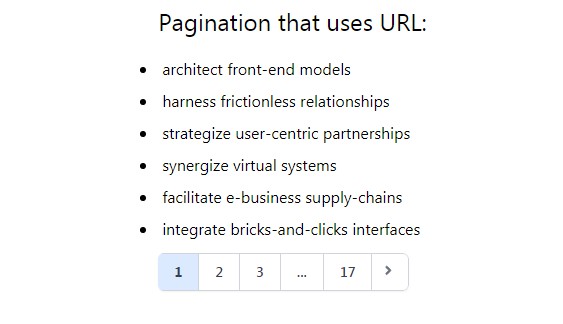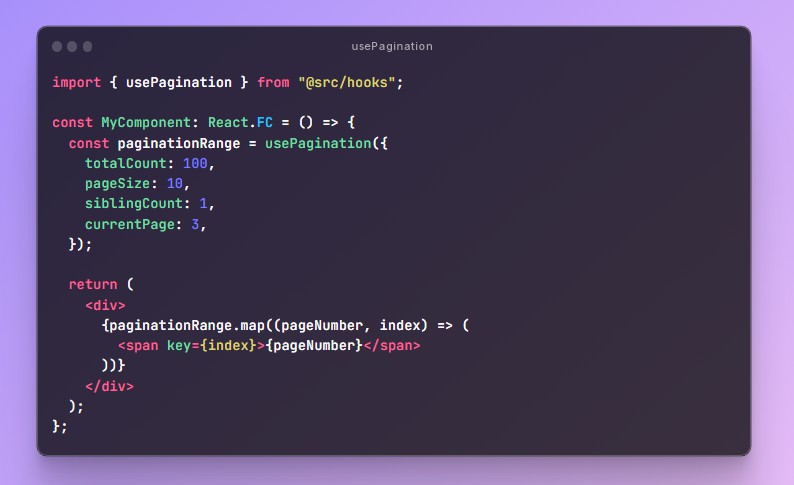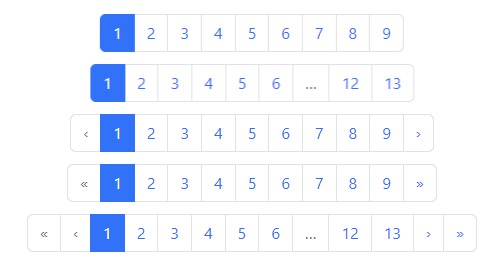url-pagination
This project has 2 goals:
- provide utilities to compute pagination params inside your React components
- persist pagination params as a part of URL so a page can be reloaded and linked to (currently we support Next.js router).
Getting started
In your shell:
yarn add next-url-pagination
# or
npm install next-url-pagination
In your component:
// ...
import { useUrlPagination } from 'url-pagination';
function MyComponent () {
const pagination = useUrlPagination({ perPage: 6 });
// use a data fetching library of your choice
const { data, error } = useSWR<Response>(
`/some-api/posts?offset=${pagination.offset}&limit=${pagination.perPage}`
);
return (
<>
<PostsList posts={data.posts}/>
<MyPagination total={data.total} page={pagination.page} onChange={pagination.onChange} />
</>
)
}
If you want to keep pagination in React state instead of URL, instead of useUrlPagination use usePagination.
useUrlPagination
useUrlPagination(args: UseUrlPaginationArgs): PageInfo has the following signature:
// pass to useUrlPagination
type UseUrlPaginationArgs = {
perPage: number; // number of records per page
page?: number = 0; // specify initial page or make the component controlled (if the value changes)
scrollToTop?: boolean = false; // scroll page to the top upon navigation
hotkeys?: boolean = false; // use left/right arrows and page up/down to navigation through pagination
total?: number; // specify total records, optional, but recommended, without it hotkey pagination won't know when the last page is reached
pageKey?: string = 'page'; // under what key the current page is going to appear in URL
perPageKey?: string 'size'; // under what key the page size is going to appear in URL
shallowNavigation?: boolean = true; // if true performs shallow Next.js router navigation upon changes
includeHref?: boolean = false; // this argument is passed through to returned results
}
// get as a result
type PageInfo = {
perPage: number; // size of the page, how many records each page contains
offset: number; // what's the offset from the start
page: number; // current page, maybe seen as redundant because there's `offset`, but different APIs use different params, it's here for convenience
onChange: (page: number) => void; // function to call when a page changes
onPerPageChange: (perPage: number) => void; // function to call when a page size changes
pageKey: string; // see UseUrlPaginationArgs, passed through without changes
hrefBuilder: (pageIndex: number) => string; // call this function to build a new URL path based on page number
includeHref: boolean; // passed through from arguments
}
usePagination
usePagination(args: UsePaginationArgs): PageInfo has the following signature (PageInfo is the same as for UseUrlPaginationArgs):
// pass to usePagination
type UsePaginationArgs = {
perPage: number; // number of records per page
page?: number = 0; // specify initial page or make the component controlled (if the value changes)
scrollToTop?: boolean = false; // scroll page to the top upon navigation
hotkeys?: boolean = false; // use left/right arrows and page up/down to navigation through pagination
total?: number; // specify total records, optional, but recommended, without it hotkey pagination won't know when the last page is reached
}
calculatePage
Utility to return the current page index based on offset and page size
calculatePage = ({
offset: number;
perPage: number;
}): number
Pagination component
The "presentation" component is not included in this library, because it's likely going to look very different in each app, however, you can find an example implementation at example/components/Pagination/index.tsx
Tree shaking
To enable tree shaking and save some space you can import functions like so:
import useUrlPagination from 'url-pagination/useUrlPagination';
import usePagination from 'url-pagination/usePagination';
// ...




